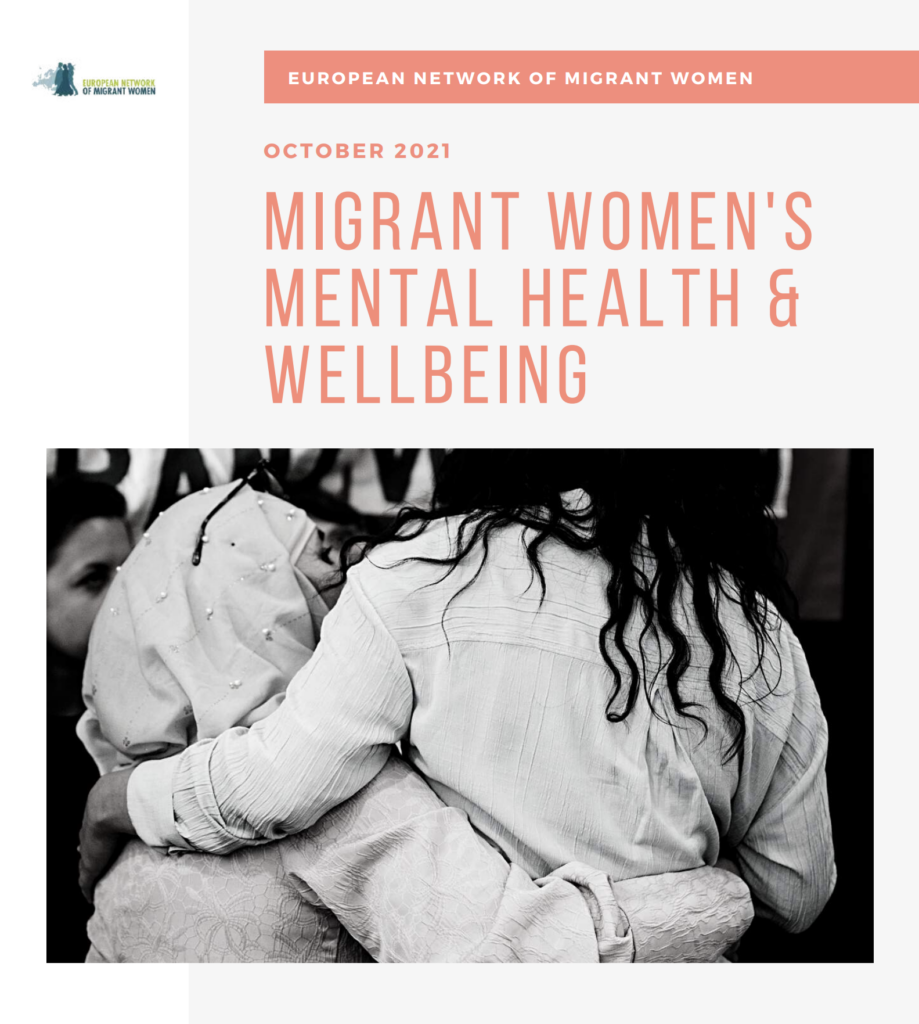European Network of Migrant Women

Report Launch: Migrant Women's Mental Health and Wellbeing
7 October 2021
European Network of Migrant Women is happy to share our new report on the Mental Health of Migrant and Refugee Women and Girls, available in English and French, that we created collaboratively with our member organisations, individual migrant women, experts working with and for migrant women.
While preparing this report we came across a serious lack of data on migrant women accessing health services and, specifically, mental health services in different European countries. We are therefore aiming to publish this report as a door opener for a more comprehensive research and data collection (both qualitative and quantitative) on the mental health of migrant women in Europe.
The report provides a synopsis of
- Different experiences of migrant and refugee women and professionals working with migrant women;
- A summary of different mental health factors that can trigger mental illness;
- A snapshot of challenges and root-causes which have a particularly grave impact on the wellbeing of migrant women;
- Barriers to accessing health and mental health services;
- Useful approaches for addressing migrant women’s needs in relation to mental health and wellbeing.
Biopsychosocial Model of Mental Health
The biopsychosocial model understands health and ill-health as one - an outcome of psychological, physiological and sociocultural characteristics and factors which influence each other. The biopsychosocial model emphasises the importance of the mind, body and environment as well as their interactions, for a person's well-being. For instance, a refugee woman who has fled her country of origin for reasons of war may have experienced a number of different life-threatening stressors compared to a man fleeing the same country, or a woman from a different age group or socio-economic background, which can develop into ill- mental health over time. Each of us carry different degrees of vulnerabilities to mental health problems which is why people can have similar experiences yet with different mental health consequences. .

The narratives in this report are from professionals working with migrant women, and migrant and refugee women themselves. The experiences, which are varied and based in different EU countries (Belgium, Hungary, Italy, Greece, UK, Czech Republic, Spain, France, Germany, Netherlands, Finland and Ireland) give us a substantial overview of what is being achieved and what needs to be tackled in relation to mental health care systems in Europe.
During migration, in addition to living with pre-migration traumatic experiences, many women encountered different stressors, such as restrictions and barriers in access to housing, education, health, career; low or no income, the burdensome and unwelcoming processing of their asylum cases, lack of governmental support and discrimination in the services, which left them with feelings of anxiety, depression, and post-traumatic stress disorder. Some of these women often linked their negative emotions such as stress and anxiety to loss of professional status and having no power over their lives - they felt like they had ‘become a nobody’.
The report highlights the importance of overcoming language barriers, the gaps in the intercultural understanding of the professionals, long waiting times to see a mental health specialist, lack of access to basic information, lack of awareness about services and the cultural taboos about mental health within the migrant communities. The emphases on training and recruitment of professionals from the migrant background in the health care system, availability of specialist services with expertise in service provision for women, women friendly programmes and support groups in assisting women in distress and with poor mental health, were highly recommended.
By exploring the impact on mental health of women-specific issues such as motherhood and maternity, as well as the forms of violence primarily affecting women among migrants such as domestic violence, prostitution, trafficking and female genital mutilation, this report gives different viewpoints on how the authorities can review their policies and approaches and embed the suggested recommendations in their existing systems.
